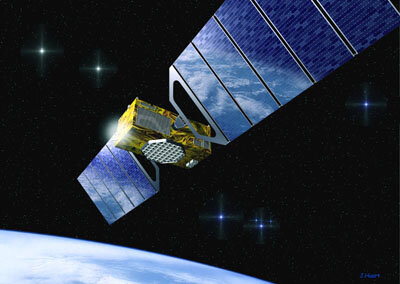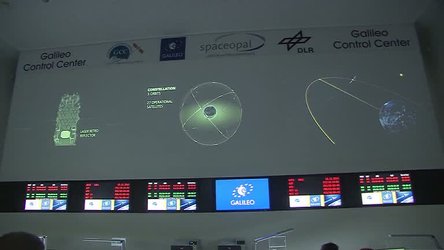ESA continues work on Galileo pending EU’s deferred decision
Work on developing Galileo, Europe's global satellite navigation system, is continuing, following the endorsement Europe's Prime Ministers gave the programme at the European Council meeting in Nice, France last November. The European Transport Council had been due to give Galileo its formal approval on 21 December, but agreed to defer the decision until April to allow further deliberations on precisely how to implement the Euro 3.2 billion project.
At the end of this month, ESA’s navigation board, backed-up if necessary by a meeting of member-state delegations, will take special measures to release enough funds to go ahead with the initial design work. The funds were approved by the ESA Council on 20 December, the day before the Transport Council, but made conditional on similar approval by the transport ministers – hence the need for special measures to unblock them.

Although the transport ministers were unable to reach consensus on how to implement Galileo, they confirmed the high political priority they attach to it. They asked the European Commission, which shares responsibility for the development of Galileo with ESA, to conduct further work on two issues before their April meeting. The issues are the nature of a public-private partnership to fund Galileo deployment, and the organisation and management of a public agency to take charge of the operational Galileo system.
The plan is to build Galileo in three stages involving a mixture of public and private finance.
The first stage, called the development and in-orbit validation phase, will cost about Euro 1.1 billion. It is to be financed equally by ESA and the EU from public money. It aims to put into orbit by the end of 2005, a handful of satellites for validating the Galileo system. This phase follows a definition phase that started in 1999 and ended in 2000 costing ESA Euro 40 million including technology development.
The development and validation phase is to be funded in two parts. The first part, costing Euro 53 million, will cover the initial design work and the consolidation of the Galileo mission requirements. The ESA member states need to allocate this money before the end of this month, January 2001. The second part, costing Euro 497 million, must be allocated before the end of 2001.
A revised Programme Declaration (the instrument that binds participating ESA member states to contributions), allowing the money to be released before the Transport Council’s April decision, is to be finalised on 30 January at a special meeting of the Navigation Programme Board.
The Euro 2.1 billion cost of the second, or deployment, phase is to be met from a mixture of public and private sources. ESA and the EU are expected to share the public slice equally. During this phase, which will end in 2007 when all the satellites are launched, industry and service providers will be able to develop commercial opportunities. The transport ministers have asked for further clarification on how much money the private sector would be expected to contribute and when.
- The third, or operations, phase, starting after 2007, will be financed by the private sector. By this time, the system will be fully operational and available for a wide variety of commercial and public service users.

Navigation satellites already guide ships, planes and spacecraft. They provide the surveying reference for roads, bridges and cities and the time reference for power and telecommunications networks. Quite soon, mobile phones will be equipped with navigation receivers, opening the way for a wide range of new personalised services.
At present, however, satellite navigation users in Europe have no alternative other than to take their positions from US GPS or Russian GLONASS satellites. Yet the military operators of both systems give no guarantee to maintain an uninterrupted service. Galileo will provide European navigators with an independent system under civilian control which will be guaranteed to operate at all times, bar the direst emergency.
The European Commission and the European Space Agency have been defining the Galileo system. The Commission has taken responsibility for policy and the definition of the system architecture, while the Agency has concentrated on the definition of the satellite constellation, ground segment and associated technology.
The two organisations have drawn up a baseline design, which consists of 30 satellites in medium earth orbit (MEO), an extensive network of ground stations, and local and regional service centres.
The satellites will orbit at an altitude of about 23,000 km. Their positions will be monitored continuously by the ground stations, which will send integrity data to them. The local and regional service centres will be operated by companies providing a variety of global positioning and timing services for many types of user. These include transport authorities, companies and utilities requiring precise timing information, and individual users of mobile phones that incorporate satellite navigation receivers.
The signals broadcast by the satellites will be geared to three different types of user. The basic signal will be free of charge and available to all users. Those requiring a more accurate service with guaranteed availability will pay to access a data stream modulated on the basic signal. And finally a highly secure signal will be available to public authorities for security and safety critical applications such as the regulation of air, sea and road transport.








